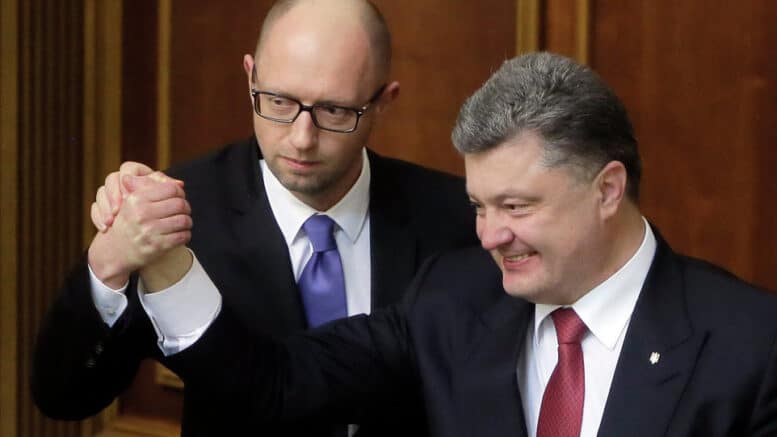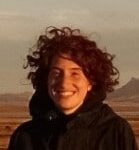Ukraine’s New Ruling Political Parties
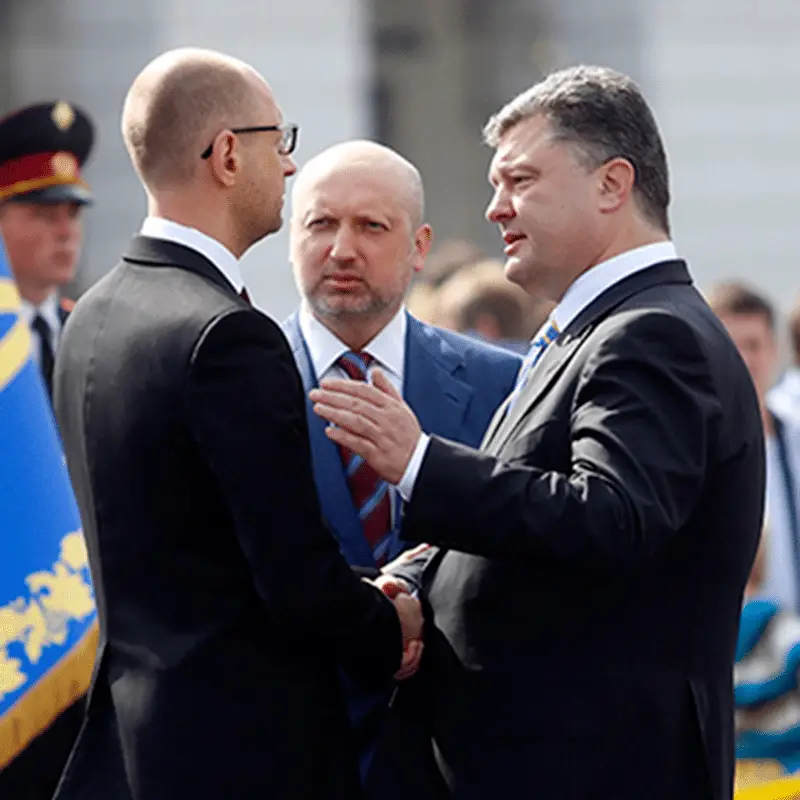
From left to right: Arseniy Yatsenyuk, Oleksandr Turchynov, and Petro Poroshenko. For more on Ukraine’s political leaders, see our Who’s Who of Ukrainian Politics.
Ukraine’s two most powerful political parties, Bloc of Petro Poroshenko and People’s Front, are both new political formations. Both were created and both rose to power only after the Maidan revolution and shortly before the 2014 Ukrainian parliamentary elections. At the same time, the two parties which had dominated Ukrainian politics until that time, were crumbling.
This resource examines Bloc of Petro Poroshenko and People’s Front, Ukraine’s two most powerful political parties. The political platforms of both parties in full and in English with brief backgrounders in an attempt to ascertain what voters felt they were voting for when voting for these two new parties. The histories and platforms also help explain the sudden fall of Tymoshenko’s Batkivshchyna party, a long-standing, pro-Western party which many assumed would fare well after the Maidan.
Below is the introduction and analysis. The party platforms can be found in the following links:
Part I: Bloc of Petro Poroshenko
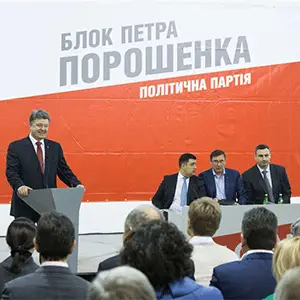
Poroshenko at a press conference in front of his party’s logo.
Bloc of Petro Poroshenko, a pro-Western Ukrainian political party, has an interesting history that revolves around its leader and name sake, Ukrainian President Petro Poroshenko.
This history spans the gambit of Ukraine’s political field. Petro Poroshenko was a member of the pro-Russian Social Democratic Party of Ukraine (united). when he decided to create a new parliamentary faction called “Solidarity.” This faction pulled Social Democrats but also recruited members of the leftist Peasants’ Party of Ukraine and Hormada, a political party where Yulia Tymoshenko, one of the leaders of the Orange Revolution, got her start in Ukrainian politics.
Poroshenko created a new party, Party of Ukraine Solidarity, based on the Solidarity faction. In November, 2000, this party helped create the Party of Regions, the pro-Russia party that was once led by now-ousted president Yanukovych. For a short time, Poroshenko was a deputy and co-chairman of the Party of Regions. However, within a year he was pursuing a connection to the Our Ukraine Bloc, led by Victor Yushchenko, the other major leader of the Orange Revolution.
These two massive shifts caused many rifts within Solidarity. Several members of the Peasants’ Party left when the merger with the Party of Regions was underway. Many others left when Poroshenko tried to switch to a more pro-Western course to Yushchenko’s bloc. However, Poroshenko and many of his supporters joined the Our Ukraine bloc in time for the 2002 parliamentary elections. Poroshenko’s party separated from Our Ukraine in 2004 and stopped participating in elections thereafter. The party was dissolved in 2013 by the Ministry of Justice for political inactivity.
In 2014, Petro Poroshenko became leader of the National Alliance of Freedom and Ukrainian Patriotism “OFFENSIVE,” which was renamed All-Ukrainian Union Solidarity. Members of this party came from the former Solidarity movement but also included members recruited from other parties including Tymoshenko’s Batkivshchyna party. In August, after Poroshenko’s election to the presidency of Ukraine, the party was renamed Bloc of Petro Poroshenko. Former Minister of Internal Affairs Yuriy Lutsenko was elected party leader. Lutsenko had been recruited from the Self Defense Party, which had once been associated with Our Ukraine and had once been in merger talks with Batkivshchyna.
Bloc of Petro Poroshenko is united behind the President’s goals for Ukraine. The party’s primary objectives include Ukraine’s membership in the EU, a peaceful resolution to the war in Donbass, governmental reforms aimed at decentralization and anticorruption, and increased social protection for low-income citizens. The party maintains that Ukrainian should remain the nation’s sole official language but also supports language rights for Russian speakers.
Many argue that Bloc of Petro Poroshenko’s success in the 2014 parliamentary elections demonstrated Ukrainians’ support for Euromaidan’s aims, and concern for Ukraine’s territorial integrity and defense capabilities. Others counter that voter participation was low or non-existent in the separatist regions of Eastern Ukraine and in Crimea, which is now claimed by both Russia and Ukraine. Thus, the results of the election do not reflect the views of all segments of Ukraine’s declared population.
Solidarity, in its various forms, was a minor player in Parliament until 2014. In 2002, as part of Our Ukraine, the party held 13 of Verkhovna Rada’s 450 seats. After a nearly 10-year hiatus from politics, the party was dissolved, reformed, won the presidency and launched into first place in parliament. Petro Poroshenko was elected in the first round of voting with 54.7% of the popular vote out of a field of six major candidates. In the October 2014 Parliamentary elections, the party, now the Bloc of Petro Poroshenko, took 132 of 450 seats, more than any other party. It earned 21.83% of the popular vote, second to Prime Minister Arseniy Yatsenyuk’s People’s Front party.
The party’s platform as used for the 2014 parliamentary elections, has been translated for the first time to English by SRAS Translation Abroad Scholar Sophia Rehm and is available here.
Part II: Rise of People’s Front; Fall of Batkivshchyna
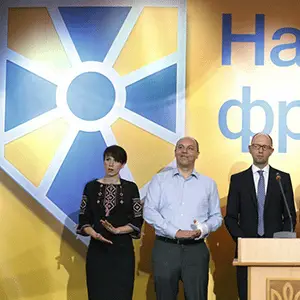
Yatsenyuk at a press conference in front of his party’s logo.
People’s Front is a new political party in Ukraine, founded in March 2014 by Prime Minister Arseniy Yatsenyuk and former Parliament Chairman Oleksandr Turchynov. Yatsenyuk is the former leader of the All-Ukrainian Union “Fatherland” (Batkivshchyna) party of Yulia Tymoshenko. He headed that party’s list in the 2012 election after Tymoshenko’s imprisonment. Turchynov was also a ranking member of Batkivshchyna and had served as a parliamentary deputy with the party. Both politicians were vocal supporters of the Euromaidan protests.
In August, 2014 Yatsenyuk and Turchynov broke with Batkivshchyna, after that party decided that Tymoshenko would head the party list in the October elections. In September, a party congress of their supporters established the new People’s Front party, electing Prime Minister Yatsenyuk chairman of the political council. Original members of the party included several former Batkivshchyna members.
The party is very vocally supportive of Ukraine’s military operations in its East. The party includes a military council, made up of high-ranking members of the territorial defense battalions. The council develops proposals to strengthen Ukraine’s defenses.
The objectives and values of People’s Front are similar to those of Bloc of Petro Poroshenko although the People’s Front is more hawkish and nationalist in its rhetoric. Yatsenyuk’s party is an advocate of Ukraine’s membership in the EU, the development of a militarily strong and politically democratic nation, maintaining Ukrainian’s status as the sole state language, and the protection of Ukraine’s territorial integrity. Yatsenyuk’s party has been more ambiguous in its vision for a resolution to the war in Donbass, using militaristic rhetoric and suggesting support for a military solution to the conflict. The party’s victory in the parliamentary election’s popular vote is in part a reflection of the resonance of such rhetoric with participating voters.
The Batkivshchyna party, in which most of People’s Front’s members have their roots, was historically a leading party in Ukraine. In 2002, the party controlled only 13 of 450 Rada seats, but in 2005 the party leader, Yulia Tymoshenko, became Ukraine’s Prime Minister, a post she held until 2010. As part of the Yulia Tymoshenko Bloc, the Batkivshchyna party controlled 109 seats in 2007. In 2012, now an opposition party, it held 101 seats.
In 2014, Batkivshchyna’s seats in Parliament dropped to just 19 out of 450, having lost many members and voters to the two new liberal parties and many of its more nationalist supporters to the Radical Party. People’s Front, however, created by former Batkivshchyna members, gained 82 seats and won 22.16% of the popular vote.
The new People’s Front party has eclipsed Tymoshenko’s, and in November its founder, Yatsenyuk, was confirmed as Prime Minister, a position he first assumed in February after the 2014 revolution. Though it does not control as many seats as Poroshenko’s party, People’s Front won the popular vote and, with its leading man the head of the nation’s new government, appears to have attained a near-equal footing with the president’s Bloc.
The party’s platform as used for the 2014 parliamentary elections, was translated for the first time to English by SRAS Translation Abroad Scholar Sophia Rehm. It is available here.
Part III: Potential for Cooperation
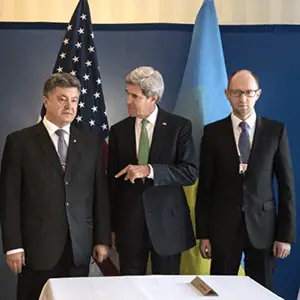
Poroshenko and Yatsenyuk meeting with US Secretary of State John Kerry.
With Ukraine’s two leading parties represented by the nation’s two most powerful figures – its President and its Prime Minister – and with nearly equal mandates – there has been much speculation and concern about the parties’ potential for cooperation. The two men have not historically worked together. Talks between Poroshenko and Yatsenyuk about uniting their parties for the October 2014 parliamentary elections broke down, and Yatsenyuk announced that he did not agree with the President’s party despite sharing its goals.
Suspected reasons for the breakdown in talks include a dispute over the party name, or over the power to appoint a Cabinet of Ministers, suggest that disagreements were not ideological, but rather political power struggles between the two men. After the elections, however, the parties, and their leaders, have shown greater cooperation, at least initially. Before the election, Poroshenko reportedly wanted to replace Yatsenyuk with ally Volodymyr Groysman as Prime Minister, but People’s Front’s strong showing in the election virtually ensured that Yatsenyuk would hold the position. Some analysts have suggested that the success of People’s Front reflected citizens’ desire to avoid a monopoly of power in Poroshenko’s hands, and that Poroshenko supporters may even have cast votes for People’s Front to support cooperation between the country’s two most powerful figures.
At the end of November, Yatsenyuk and Poroshenko organized the formation of a parliamentary coalition consisting of five pro-Western parties: Bloc of Petro Poroshenko, People’s Front, Samopomich, Batkivshchyna, and Radical Party. The coalition now holds an absolute majority, making Ukraine’s parliament solidly pro-Western. Poroshenko indicated that he would back Yatsenyuk’s confirmation as Prime Minister, and Yatsenyuk announced that he would support Poroshenko’s proposals for Foreign and Defense Ministers (Yatsenyuk himself would propose candidates for the remaining Cabinet positions).
The two men, and their parties, share goals of moving Ukraine in the direction of the European Union and the West, incorporating Western political and social standards into Ukrainian democracy, and protecting Ukraine’s national identity and territorial integrity. If they are serious about reaching these goals, they will need to recognize the danger of undermining them with inter-party conflict and individual power struggles.
Translations by Sophia Rhem. Introductions and analysis by Sophia Rhem and Josh Wilson.


